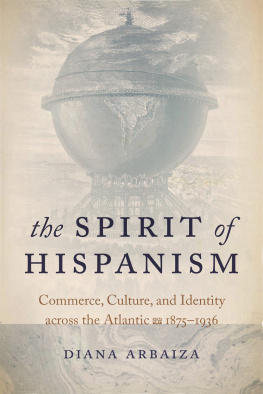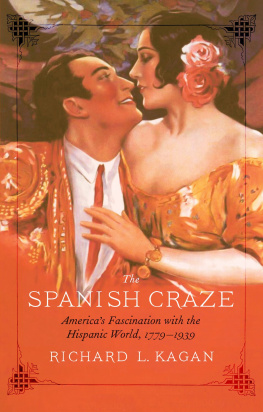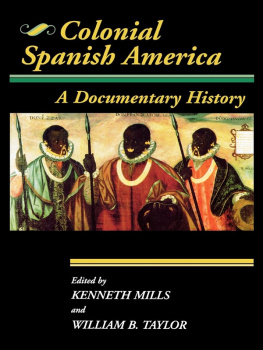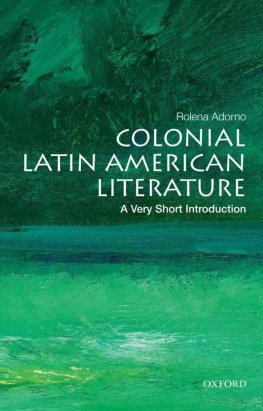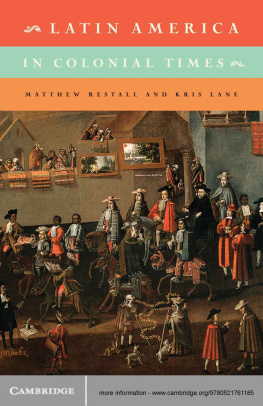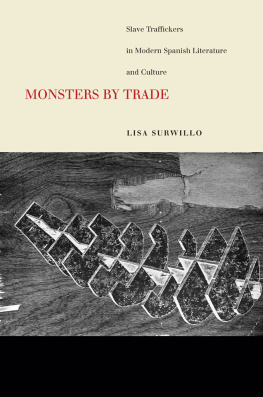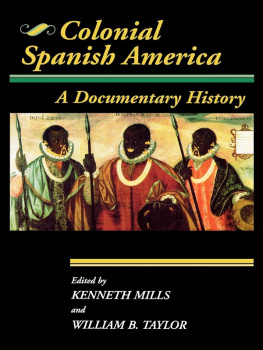ACKNOWLEDGMENTS
I would like to start by thanking my editor, Eli Bortz, for believing in this project, and the team at Notre Dame for making it possible. Throughout the long process of creating this book, many people have influenced my ideas, but I would like to give special credit to those who had the most direct impact. I am the only one responsible for any errors in this work, but the following people inspired the best aspects of this project.
Even though this book departed enormously from my doctoral dissertation, the intellectual foundation behind it is undoubtedly shaped by my professors at the University of Illinois: Elena Delgado, Joyce Tolliver, and Mariselle Melndez. Special thanks to Michael Palencia-Roth, who inspired me to research cross-cultural exchanges, and to my advisor, Ericka Beckman, who guided me into new theoretical fields and venues of inquiry. I feel very grateful for her ongoing mentorship and for her valuable feedback on this project.
This book would not have been possible without the support of my colleagues in the Department of Foreign Languages and Literatures at North Carolina State University. I thank Ruth Gross for her endeavors to facilitate my research and for the time and means made available for my archival work in Spain. Even more important was the stimulating and encouraging environment at NC State. I benefited enormously from the exchange with all my colleagues, but I would like to particularly mention Agustn Pastn and Patricia Morgado, as well as Shelley Garrigan, who read several chapters of the book and gave me the sharpest and most constructive criticism. I am profoundly indebted to Elvira Vilches and Jordi Mar for their brilliant scholarly inspiration and their generosity as friends. Our conversations on literature, economy, and national identity were fundamental to this book and their belief in the project one of my strongest motivations.
I was finalizing the manuscript when I decided to move back to Europe. I would like to thank my colleagues at the University of Antwerp for providing support and determination during the final stages, especially Rita De Maeseneer, who read and commented on the introduction. In the United States, I owe thanks to Ronald Briggs, and to Lisa Burner for her gracious and insightful suggestions about portions of the book.
During this process I have been fortunate to find a great source of comfort in my friends and families: my aunts and uncles in Spain and my family in Vermont have been incredibly supportive and demonstrated a stoic endurance to listen to my ramblings about Hispanism. The good cheer of my friends in Bilbao sustained me and provided needed distraction. I especially want to thank my parents, Victor Arbaiza and Luca Tena, who patiently encouraged me in every step of this process and helped my partner and I to take care of our son while I did archival research.
My greatest debt and gratitude go to my husband, Sasha Newell, who was my strongest support intellectually, emotionally, and pragmatically. He read and discussed this book multiple times, and while his luminous thinking always drove me to improve my claims, his company soothed the pains of writing. He entertained our son in intricate board games so that I could work on this book, and he also knew when to remind me of the importance of play.
Finally, my son, Ibai, has been my true inspiration, the person who most motivated me and the one who gave me perspective. Este libro va dedicado a mis dos chicos.
Afterword
The establishment of the Hispanic Civilization Foundation mentioned in the introduction creates a feeling of dj vu, bringing to mind the Hispanist campaigns of the early twentieth century. Most of those involved in Hispanism perceived it as a failed movement, for they did not see it unfolding as they had imagined. Nevertheless, some of the discourses surrounding Hispanism, as well as the dreams and aspirations that fueled it, have demonstrated an enduring allure, periodically reemerging in Spanish public culture. In fact, the Hispanic Civilization Foundation is only the most recent installment in a series of discourses and practices rooted in Hispanism that resurface from time to time in Spanish society. This discussion leads me, by way of conclusion, to a brief reflection on the continuing role of the Hispanist legacy in the transatlantic relationship, especially recent interplay between economic and cultural ties.
During the development of free-market policies in the rise of neoliberalism in the 1980s and 1990s, Spain paid particular attention to its special relationship with Spanish America, achieving what Eric Baklanoff (1996) even called the reconquest of the Latin American markets. This economic expansion denoted that, at a time when markets were becoming more interconnected and scholars began talking of globalization, Spanish capitalism focused on the same markets that it had long before aimed to recover. The role of cultural bonds in this recent reconquest will require further study, but a brief look at the scholarly literature on this expansion (Baklanoff 1996; Casilda Bejar 2002; Cecchini and Zicolillo 2002) indicates that Spanish multinationals did not particularly stand out from other corporations in their operations in Spanish America, either through their idealism or any special treatment of their brethren. Yet, around the end of Baklanoffs reconquest period, the discourse of Hispanic idealism was not completely buried. Jos Luis Abelln referred to Webers description of the Protestant ethos to define the Anglo-Saxon countries as una cultura que encuentra su razn de ser en el xito social-econmico o politico (2003) [a culture that finds the reason for its existence in political or socioeconomic success]. This attitude, he claimed, was diametrically opposed to the Spanish spirit. Abelln, who was criticizing Jos Mara Aznar for forging a coalition with the United States and the United Kingdom during the war in Iraq, warned that this association not only was unpopular among Spanish citizens, but also distracted Spain from its longer alliance with Spanish America: la solidaridad de la hispanidad. Citing Altamira, Abelln argued that the nations within this Hispanidad shared the Spanish spirit that Spain had carried to America and that constituted the antithesis of Anglo-Saxon culture:
Una interpretacin evanglica de la pobreza, caracterizadora de la moral catlica, llev a considerar que el hombre y su valor intrnseco estn por encima sus posesiones materiales.... ste es el espritu de lo espaolen las antpodas de lo anglosajny que Espaa llev a Amrica creandocomo deca Rafael Altamirauna civilizacin espaola. (2003)
[An evangelical interpretation of poverty, characteristic of Catholic morality, led to the consideration of man and his intrinsic value as above material possessions.... That is the Spanish spiriton the antipodes of the Anglo-Saxonthat Spain took to America creatingas Rafael Altamira saida Spanish civilization.]
The persistence of this characterization, combined with the blatant economic reconquest examined by Baklanoff, is not only puzzling but also leads one to wonder, how much of Hispanism has survived in democratic Spain?
After the end of Francoism, Spain opened a new phase of relations with Spanish America. This new stage supposedly represented the political and economic strategies of democratic Spain, but, as scholars have noted, still maintained some points of contact with past dynamics. During the early years of the democracy, a Spanish discourse of transatlantic solidarity bore striking similarities to the Hispanist thought of the dictatorship (Escudero 1996), and even though the notion of idealism had practically vanished, iterations of the bonds of language, history, and even blood and essence abounded. This Hispanist rhetoric permeated the speech that Juan Carlos I delivered in 1976 in his first official trip to the Dominican Republic, a trip that made him the first Spanish monarch to visit Spanish America. He employed the tired language of familial reunion and called for help in organizing an Ibero-American exhibition as part of the celebrations of the fifth centennial. This project was ultimately transformed into a more ambitious project, the Universal Exposition of 1992 in Seville, which was envisioned as a spectacle of progress of a post-Francoist Spain, now a modern nation integrated within the European Community. The same year, Barcelona hosted the Olympic Games and Madrid became the European Capital of Culture of the year. The selection of the anniversary of the colonization of the Americas as the occasion to showcase Spain as an innovative and prosperous society that had finally overcome its economic backwardness and the isolationism of the dictatorship spoke of the symbolic value that the date still held for Spanish nationalism. By 1992 Spain had been a member of the European Community for six years and was hosting the Ibero-American Summit, the second in a series of meetings that Spain and Mexico promoted together. The successive Spanish governments of the democratic period thus not only worked to advance its Ibero-Americanist and Europeanist exterior politics, but also aimed to present Spain as an indispensable mediator or bridge between Spanish America and Europe.
Next page
